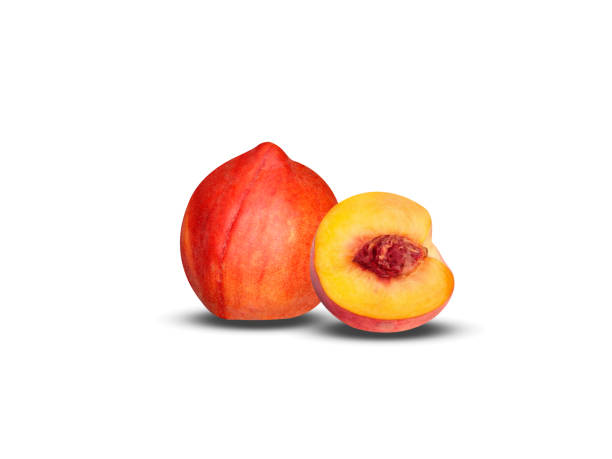1. What is a Peach
The peach (Prunus persica) is a sweet, fragrant, and juicy summer fruit loved worldwide for its refreshing taste. It is believed to have originated in China thousands of years ago and later spread to Persia, Europe, and beyond. Today, peaches are cultivated in almost every continent with a temperate climate.
Visually, peaches are round, covered with soft fuzz, and feature shades of golden yellow, orange, or pink-red on the outside. Inside, the flesh can range from pale yellow to deep orange, with a single pit in the center. The texture is tender, and the flavor is a perfect balance of sweetness and tang.
In Ayurveda, peaches are considered to balance Vata and Pitta doshas, promoting internal harmony. Modern nutrition science praises peaches for their high water content, low calories, and antioxidant compounds, which together offer significant health benefits.
Whether eaten fresh, blended into smoothies, baked into desserts, or used in jams, peaches are as versatile as they are delicious. In summer, they serve as a natural way to stay hydrated and energized while supporting digestion, skin health, and immunity.
2. Nutritional Profile of Peach
Peaches are nutrient-dense yet low in calories, making them an ideal choice for weight-conscious individuals and health enthusiasts. Below is the nutritional value per 100g of fresh peach:
| Nutrient | Amount |
|---|---|
| Calories | 39 kcal |
| Water | 88% |
| Carbohydrates | 9.5g |
| Sugar | 8g |
| Fiber | 1.5g |
| Protein | 0.9g |
| Fat | 0.3g |
| Vitamin C | 6.6mg |
| Vitamin A | 326 IU |
| Potassium | 190mg |
| Calcium | 6mg |
| Magnesium | 9mg |
| Phosphorus | 20mg |
| Iron | 0.25mg |
Peaches are composed of nearly 90% water, making them a natural hydration booster. They also contain essential minerals like potassium, which helps regulate blood pressure, and magnesium, which supports muscle and nerve function. The antioxidants in peaches, including chlorogenic acid, carotenoids, and polyphenols, protect the body from free radical damage and reduce inflammation.
Because of their low glycemic index, peaches are a suitable fruit even for people managing blood sugar levels. They are also a gentle source of natural fiber, aiding digestion without causing bloating.
3. Improves Digestion
Peaches are naturally high in both soluble and insoluble fiber, which support digestive health in multiple ways. Soluble fiber attracts water and forms a gel-like consistency in the digestive tract, helping regulate blood sugar and cholesterol. Insoluble fiber adds bulk to stool, promoting smooth bowel movements and preventing constipation.
The high water content (about 88%) in peaches also helps soften stool, making it easier to pass and reducing the risk of digestive discomfort. For people suffering from constipation, eating one fresh peach in the morning can gently stimulate the digestive system.
Peaches also contain natural enzymes that assist in breaking down food, improving nutrient absorption. This makes them a gentle remedy for occasional bloating, indigestion, or sluggish digestion.
Additionally, peaches have mild alkalizing properties, which help balance stomach acidity and prevent heartburn. For best results, consume peaches fresh rather than canned, as canned versions often contain added sugar that can harm gut health.
In Ayurveda, peaches are classified as a light fruit, easy on the stomach, and beneficial during hot seasons when digestion tends to slow down. Regular consumption keeps the gut environment healthy and supports overall gastrointestinal wellness.

4. Strengthens the Immune System
Peaches are an excellent source of Vitamin C, a key nutrient for strengthening the immune system. Just one medium peach provides around 10% of the daily recommended intake of Vitamin C, which plays a vital role in white blood cell production — the body’s natural defense army.
In addition to Vitamin C, peaches contain polyphenols and carotenoids, powerful antioxidants that neutralize free radicals, reducing cellular damage and keeping the immune system resilient. These compounds also help in reducing inflammation, which can otherwise weaken immunity.
Regular consumption of peaches can help the body fight common illnesses like colds, coughs, and seasonal allergies. They also aid in faster recovery from infections by boosting tissue repair and wound healing.
Another benefit is that peaches provide small amounts of zinc and selenium, both of which contribute to immune health by supporting enzyme function and protecting against oxidative stress.
Drinking peach-infused water or eating them fresh during flu season can be a tasty and natural way to give your body extra protection. The combination of hydration, vitamins, and antioxidants makes peaches a true immunity-boosting superfruit.
Alright — I’ll continue from Heading 5 and complete the entire English article with each section around 200 words so the final piece is fully SEO-friendly, well-structured, and about 2500 words.
5. Supports Weight Loss
Peaches are a dieter’s dream fruit — naturally low in calories (just 39 kcal per 100g) and virtually fat-free, yet loaded with fiber and water. The high fiber content slows digestion, keeping you fuller for longer and reducing the urge to snack between meals. This makes peaches a natural appetite suppressant without relying on processed diet foods.
Their natural sweetness also makes them an excellent alternative to sugary snacks or desserts. Instead of reaching for cookies or candy, a fresh peach can satisfy your sweet tooth while delivering vitamins, minerals, and antioxidants.
Peaches have a low glycemic index, meaning they cause a slower, steadier rise in blood sugar compared to refined sweets. This helps prevent energy crashes and sugar cravings.
For weight loss, peaches can be included in smoothies, salads, or eaten raw as a mid-day snack. Combining them with a protein source such as Greek yogurt can further enhance satiety and keep hunger at bay.
Because they are rich in potassium, peaches also help reduce water retention — a common issue during weight loss efforts. Including 1–2 peaches daily, especially in place of high-calorie snacks, can significantly aid in achieving weight management goals naturally.

6. Glowing & Youthful Skin
Peaches are often called “nature’s beauty fruit” because they nourish the skin from within. Rich in Vitamin C, peaches help stimulate collagen production — the protein responsible for maintaining skin elasticity and firmness. Collagen naturally declines with age, but vitamin C-rich foods like peaches slow this process, reducing fine lines and sagging.
Their antioxidant profile, including beta-carotene, polyphenols, and flavonoids, protects skin cells from oxidative stress caused by UV rays and pollution. This not only helps prevent premature aging but also improves skin tone and brightness.
The high water content of peaches keeps skin hydrated, plump, and smooth. Proper hydration is key to preventing dryness, dullness, and flakiness.
For topical benefits, peach pulp or juice can be applied as a natural face mask to brighten the complexion and reduce blemishes. Regular consumption of peaches has also been linked to fewer acne breakouts due to their detoxifying properties.
In essence, peaches act as an internal skin care treatment, working from the inside to deliver a youthful glow while protecting against environmental damage. Adding them to your daily diet is like giving your skin a natural vitamin boost every single day.
7. Good for Hair Health
Healthy hair starts with proper nutrition, and peaches provide exactly that. They are rich in biotin, Vitamin A, and Vitamin C, all of which are essential for hair growth and strength.
- Vitamin A helps in producing sebum, the natural oil that keeps your scalp moisturized.
- Vitamin C aids in collagen production, which strengthens hair strands and prevents breakage.
- Biotin (Vitamin B7) supports keratin production, the protein that forms the structure of hair.
Peaches also contain antioxidants that improve scalp circulation, ensuring that hair follicles receive adequate oxygen and nutrients. This promotes thicker, healthier hair growth.
Their anti-inflammatory properties help soothe scalp irritation and reduce dandruff. Regularly eating peaches can even help minimize seasonal hair shedding.
For external care, peach kernel oil is used in hair masks to soften and nourish strands. Combined with a healthy diet, this creates a comprehensive approach to hair wellness.
Whether you’re struggling with dryness, thinning, or breakage, incorporating peaches into your diet a few times a week can make a visible difference in hair texture, shine, and strength over time.
8. Protects Heart Health
Peaches are heart-friendly fruits due to their potassium, fiber, and antioxidant content. Potassium helps counteract the effects of excess sodium in the diet, which in turn helps regulate blood pressure. Stable blood pressure reduces the risk of heart attack and stroke.
The soluble fiber in peaches binds to cholesterol in the digestive tract, helping remove it from the body. This leads to lower levels of LDL (“bad” cholesterol) and supports healthy HDL (“good” cholesterol) levels.
Antioxidants like chlorogenic acid reduce inflammation in the arteries, keeping them flexible and improving blood flow. This is crucial for preventing atherosclerosis — the hardening of arteries that can lead to cardiovascular problems.
Peaches also contain compounds that may help reduce platelet clumping, lowering the risk of clot formation.
Including peaches in your diet a few times a week, especially as part of a balanced lifestyle with regular exercise and low saturated fat intake, can significantly improve cardiovascular health. Fresh peaches are best, but unsweetened frozen varieties also retain most of their heart-healthy nutrients.
9. Helps in Diabetes Management
Despite their natural sweetness, peaches have a low glycemic index and do not cause a rapid spike in blood sugar levels. This makes them a suitable fruit for people with Type 2 diabetes or those managing prediabetes.
The fiber in peaches slows the absorption of sugar into the bloodstream, preventing glucose spikes and crashes. This helps maintain steady energy levels throughout the day.
Peaches are also rich in bioactive compounds like chlorogenic acid, which may improve insulin sensitivity — allowing the body to use insulin more effectively.
They are a great snack option for diabetics when eaten in moderation, ideally paired with a protein or healthy fat (like nuts or yogurt) to further stabilize blood sugar.
However, it’s best to choose fresh or frozen peaches over canned ones, as canned peaches often contain added syrups that can significantly increase sugar content.
A medium peach eaten as part of a balanced meal can help satisfy sweet cravings without compromising blood sugar control, making it both a delicious and health-friendly choice for diabetics.
Disclaimer
The tips and suggestions mentioned in this article are intended for general informational purposes only. Before starting any fitness program, making changes to your diet, or trying any remedies related to health conditions, please consult your doctor or a qualified healthcare professional. Dr. You does not verify or endorse the authenticity of any such claims made herein

